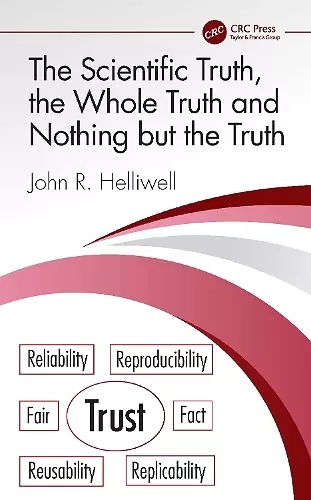The Scientific Truth, the Whole Truth and Nothing but the Truth
Format:Hardback
Publisher:Taylor & Francis Ltd
Published:5th Apr '24
Currently unavailable, and unfortunately no date known when it will be back

There is a limited understanding amongst scientists, students, and the public about realizing trust in scientific findings. This should be a paramount objective. Scientists and the public need to know more about the link between the philosophy of science and science research methods. There is a limited understanding of why accuracy is important and that it is not the same as precision. Also, there is often the need to be pragmatic and so measure an approximation of a real system, and the classic case is reductionism in biology versus whole organism biology. The author brings these topics together in terms of trusting in science.
Features
- Covers how scientific truth is perceived and increases the preparedness of early career scientists.
- Examines the relatively new field of machine learning and artificial intelligence as applied to crystallography databases in biology and chemistry for new discoveries.
- Describes the major changes in digital data archiving and how vast “raw data” archives are being increasingly developed for machine learning and artificial intelligence as well as complete truth.
- This unique volume will be of interest to pre-university and university undergraduate students, principally in science.
- Presents scientific research examples from physics, chemistry, and biology together with their methodologies <
John R. Helliwell is well known to this community for his contributions to the field of crystallography, as well as being a dedicated educator and mentor, contributing to the training and development of the next generation of scientists. His commitment to the scientific community is reflected in his extensive publication record and his active participation in various scientific organizations and conferences. His book emphasizes the distinction between accuracy and precision in scientific measurements. While precision refers to the consistency of repeated measurements, accuracy relates to how close a measurement is to the true value. My friend and former colleague Jim Pflugrath would also add that accuracy trumps precision. John also discusses the importance of pragmatic approaches in scientific research. Sometimes, practical considerations (such as available resources or time constraints) influence the choice of methods and measurements. In keeping with the significant changes in structural science brought by AI, the book explores the application of machine learning and artificial intelligence to crystallography databases in biology and chemistry. These technologies can enhance data analysis and accelerate scientific discoveries. This book is written for scientists at all stages of their careers but is directed at younger scientists. It provides insights into scientific methodology, critical thinking, and the pursuit of truth.
Joe Ferrara, Rigaku Americas
ISBN: 9781032521398
Dimensions: unknown
Weight: 312g
106 pages